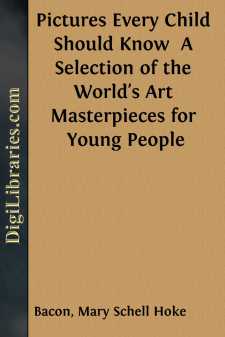Non-Classifiable
- Non-Classifiable 1768
Non-Classifiable Books
Sort by:
INTRODUCTION Man's inclination to decorate his belongings has always been one of the earliest signs of civilisation. Art had its beginning in the lines indented in clay, perhaps, or hollowed in the wood of family utensils; after that came crude colouring and drawing. Among the first serious efforts to draw were the Egyptian square and pointed things, animals and men. The most that artists of that...
more...
Once upon a time, a thousand years before Columbus discovered America, and when Rome was still the greatest city in the world, there lived a brave and beautiful youth whose name was Arthur. His home was in England, near London; and he lived with the good knight Sir Hector, whom he always called father. They dwelt in a great square castle of gray stone, with a round tower at each corner. It was built...
more...
by:
Edward Thomas
CHAPTER I—BORROW’S AUTOBIOGRAPHY The subject of this book was a man who was continually writing about himself, whether openly or in disguise. He was by nature inclined to thinking about himself and when he came to write he naturally wrote about himself; and his inclination was fortified by the obvious impression made upon other men by himself and by his writings. He has been dead thirty years;...
more...
A REVIEW OF THIS WORK, Occupying nearly four columns, appeared in the New York Tribune of Dec. 30th, 1879, from which the following is extracted. "It embraces the time from the accession of Francis I. in 1515, to the death of Charles IX. in 1574, at which epoch the doctrines of the Reformation had become well-grounded in France, and the Huguenots had outgrown the feebleness of infancy and stood as...
more...
I have promised the children to write something for them about their favourite story-teller, Juliana Horatia Ewing, because I am sure they will like to read it. I well remember how eagerly I devoured the Life of my favourite author, Hans Christian Andersen; how anxious I was to send a subscription to the memorial statue of him, which was placed in the centre of the public Garden at Copenhagen, where...
more...
by:
Sepharial
INTRODUCTION Few words will be necessary by way of preface to this book, which is designed as an introduction to a little understood and much misrepresented subject. I have not here written anything which is intended to displace the observations of other authors on this subject, nor will it be found that anything has been said subversive of the conclusions arrived at by experimentalists who have...
more...
LANDSBOROUGH'S EXPEDITION. The readers of this pamphlet are no doubt aware that the anxiety entertained for the fate of Burke and Wills led to the formation of several expeditions in their search. The first of these was formed in Melbourne and entrusted to the command of Mr. Howitt. The second in Adelaide, under Mr. McKinlay. The third from Rockhampton, under Mr. Walker; and the fourth from...
more...
MIND AND MOTION [REDE LECTURE, 1885.] The earliest writer who deserves to be called a psychologist is Hobbes; and if we consider the time when he wrote, we cannot fail to be surprised at what I may term his prevision of the most important results which have now been established by science. He was the first clearly to sound the note which has ever since constituted the bass, or fundamental tone, of...
more...
It should be understood that especially in acute conditions a positive separation of endocarditis from myocarditis is incorrect. Acute endocarditis can probably not occur without some inyocarditis, and myocarditis probably does not occur without some endocardial disturbance and perhaps some pericardial irritation. This is especially true in endocarditis which occurs during any acute infection, even in...
more...
by:
Albert H. Benson
PREFACE. In the more thickly populated portions of the Old and New World, and, to a certain extent, in the large cities of Australia, the question of how to make a living has became one of vital importance to a large portion of the population, and is the cause of considerable anxiety to fathers of families who are endeavouring to find employment for their sons. This difficulty of obtaining employment...
more...











